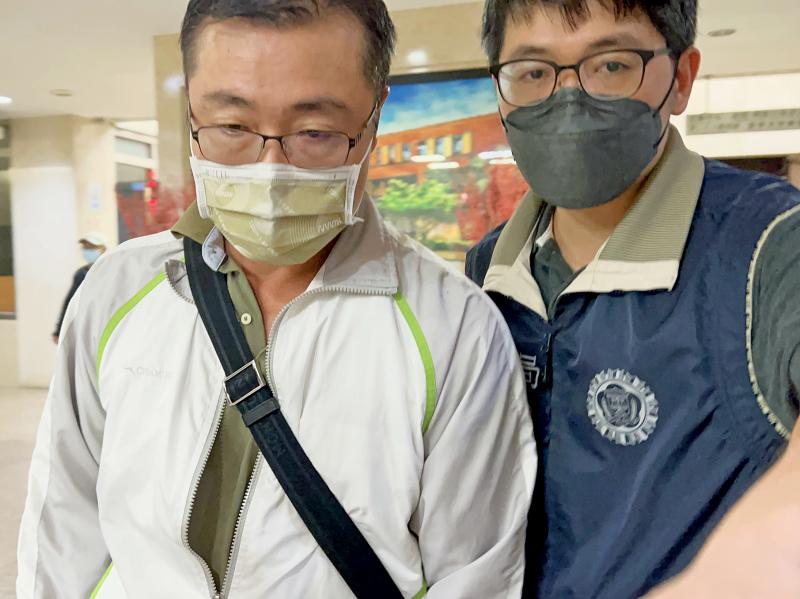Authorities on Tuesday raided the offices of the local unit of GigaDevice Semiconductor (Beijing) Inc (北京兆易創新科技) on suspicion of illegally recruiting Taiwanese technology talent to infiltrate Taiwan’s semiconductor industry.
Nine people, including Wang Wen-hao (汪文浩), a Taiwanese who heads GigaDevice Taiwan’s office in Taipei, along with the company’s chief accountant, surnamed Liu (劉), and other employees, were summoned for questioning, Taipei prosecutors said.
Wang was released on bail of NT$100,000 late on Tuesday night.

Photo: Chien Li-chung, Taipei Times
It is the first major investigation into talent poaching by suspected Chinese-funded businesses following the legislature’s passage on Friday of amendments to the National Security Act (國家安全法) which impose stiffer punishments on the illicit transfer or theft of core technologies.
According to business registry records, Wang in 2013 set up the Taiwan office as the local unit of GigaDevice Semiconductor (HK) Ltd (香港商香港商芯技佳易微電子), saying it would create jobs by conducting research and development into semiconductors and flash memory devices.
However, a preliminary investigation indicated that it was a ruse — that the Taiwan office is a shell entity for Wang and his deputies to penetrate Taiwan’s high-tech sector, aiming to poach Taiwanese talent in the IC design and memory device sectors, and to obtain proprietary technology.
The Taiwan office was set up to represent the Hong Kong firm, but both companies are controlled by GigaDevice Semiconductor (Beijing) Inc, contravening Taiwanese laws banning Chinese investment in Taiwan’s high-tech sector, court filings showed.
Chinese scientist and entrepreneur Zhu Yiming (朱一明) is the founder and owner of GigaDevice Semiconductor (Beijing), and he has total control and provides all the funding for the Hong Kong and Taiwan offices, the investigation showed.
Zhu reportedly has good connections to the Beijing government and close ties with the Chinese Communist Party (CCP).
He is Anhui Province’s representative to China’s National People’s Congress, and had studied and worked in the US under the Thousand Talent Plan jointly run by the CCP and China’s State Council, prosecutors said.
Since 2013, Wang has recruited more than 20 Taiwanese professionals, enticing them to work in China by offering them high annual salaries of NT$3 million (US$101,502) plus bonuses, prosecutors said.
One of them is an engineer surnamed Hsiao (蕭) who had worked on semiconductors at the Hsinchu Science Park, they said.
Prosecutors said that investigations of other cases have uncovered similar cases of Chinese firms skirting Taiwan’s restrictions by creating entities in Hong Kong which they use to set up business operations in Taiwan in light of Taiwan’s laxer measures governing Hong Kong firms.
However, the Hong Kong firms were later found to be directly owned and funded by Chinese entities, prosecutors said.
Employees at the Taiwan office who were questioned on Tuesday have been listed as persons of interest, prosecutors said, adding that they were summoned to provide information on the company’s operations, including money flow from China, who paid their salaries, and the people or channels through which high-tech materials and technologies are passed or processed.
Wang and his deputies are likely to face charges of contravening the Act Governing Relations Between the People of the Taiwan Area and the Mainland Area (臺灣地區與大陸地區人民關係條例), whose articles relating to national security had also been amended and passed by the legislature on Friday, prosecutors said.

South Korean K-pop girl group Blackpink are to make Kaohsiung the first stop on their Asia tour when they perform at Kaohsiung National Stadium on Oct. 18 and 19, the event organizer said yesterday. The upcoming performances will also make Blackpink the first girl group ever to perform twice at the stadium. It will be the group’s third visit to Taiwan to stage a concert. The last time Blackpink held a concert in the city was in March 2023. Their first concert in Taiwan was on March 3, 2019, at NTSU Arena (Linkou Arena). The group’s 2022-2023 “Born Pink” tour set a

CPBL players, cheerleaders and officials pose at a news conference in Taipei yesterday announcing the upcoming All-Star Game. This year’s CPBL All-Star Weekend is to be held at the Taipei Dome on July 19 and 20.

The Taiwan High Court yesterday upheld a lower court’s decision that ruled in favor of former president Tsai Ing-wen (蔡英文) regarding the legitimacy of her doctoral degree. The issue surrounding Tsai’s academic credentials was raised by former political talk show host Dennis Peng (彭文正) in a Facebook post in June 2019, when Tsai was seeking re-election. Peng has repeatedly accused Tsai of never completing her doctoral dissertation to get a doctoral degree in law from the London School of Economics and Political Science (LSE) in 1984. He subsequently filed a declaratory action charging that

The Hualien Branch of the High Court today sentenced the main suspect in the 2021 fatal derailment of the Taroko Express to 12 years and six months in jail in the second trial of the suspect for his role in Taiwan’s deadliest train crash. Lee Yi-hsiang (李義祥), the driver of a crane truck that fell onto the tracks and which the the Taiwan Railways Administration's (TRA) train crashed into in an accident that killed 49 people and injured 200, was sentenced to seven years and 10 months in the first trial by the Hualien District Court in 2022. Hoa Van Hao, a